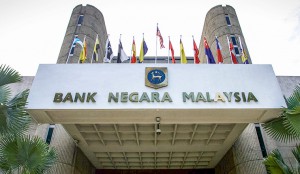Bank Negara lowers OPR by 25bps to 2.5%
 The Monetary Policy Committee (MPC) of Bank Negara Malaysia decided to reduce the Overnight Policy Rate (OPR) by 25 basis points to 2.50%.
The Monetary Policy Committee (MPC) of Bank Negara Malaysia decided to reduce the Overnight Policy Rate (OPR) by 25 basis points to 2.50%.
It said the ceiling and floor rates of the corridor of the OPR are correspondingly reduced to 2.75% and 2.25%, respectively.
“The reduction in the OPR is intended to provide a more accommodative monetary environment to support the projected improvement in economic growth amid price stability. The MPC will continue to monitor and assess the balance of risks surrounding the outlook for domestic growth and inflation,” Bank Negara said in a statement Tuesday.
The reduction in the OPR came largely in line with economists’ expectations. This is the second cut so far this year. In January, Bank Negara reduced the OPR by 25 basis points to 2.75% — the lowest since 2011.
The central bank noted that global economic conditions have weakened in the recent period. The ongoing Covid-19 outbreak has disrupted production and travel activity, especially within the region.
This has also led to greater risk aversion, resulting in tighter financial conditions and a resurgence in financial market volatility. Downside risks to the global growth outlook have increased, particularly in the near term. However, a number of countries have implemented policy responses. With further anticipated policy measures, these actions are expected to mitigate the economic impact of Covid-19.
“The Malaysian economy grew at a moderate pace of 4.3% in 2019. Looking ahead, growth, particularly in the first quarter, will be affected by the Covid-19 outbreak primarily in the tourism-related and manufacturing sectors. The weakness in the agriculture sector is also likely to persist in the first quarter.
“For 2020, private and public sector activities will be supportive of growth. Household spending is expected to grow at a slower pace amid moderate employment and income growth. Investment activity is projected to record a modest recovery, underpinned by ongoing and new projects, both in the public and private sectors,” it said.
The 2020 economic stimulus package will also provide some support to economic activity. Although domestic growth is expected to gradually improve in the second half of the year, there are key downside risks, mainly stemming from the evolving nature and prolonged impact of the Covid-19 outbreak, and continued weakness in commodity-related sectors.
Bank Negara said in 2020, headline inflation is expected to average higher but remain modest. The trajectory of headline inflation will be dependent on global oil and commodity price developments and the timing of the lifting of the domestic retail fuel price ceilings.
Underlying inflation is expected to be more moderate, amid limited demand pressures despite the continued expansion in economic activity.
Source: TheStar.com.my

